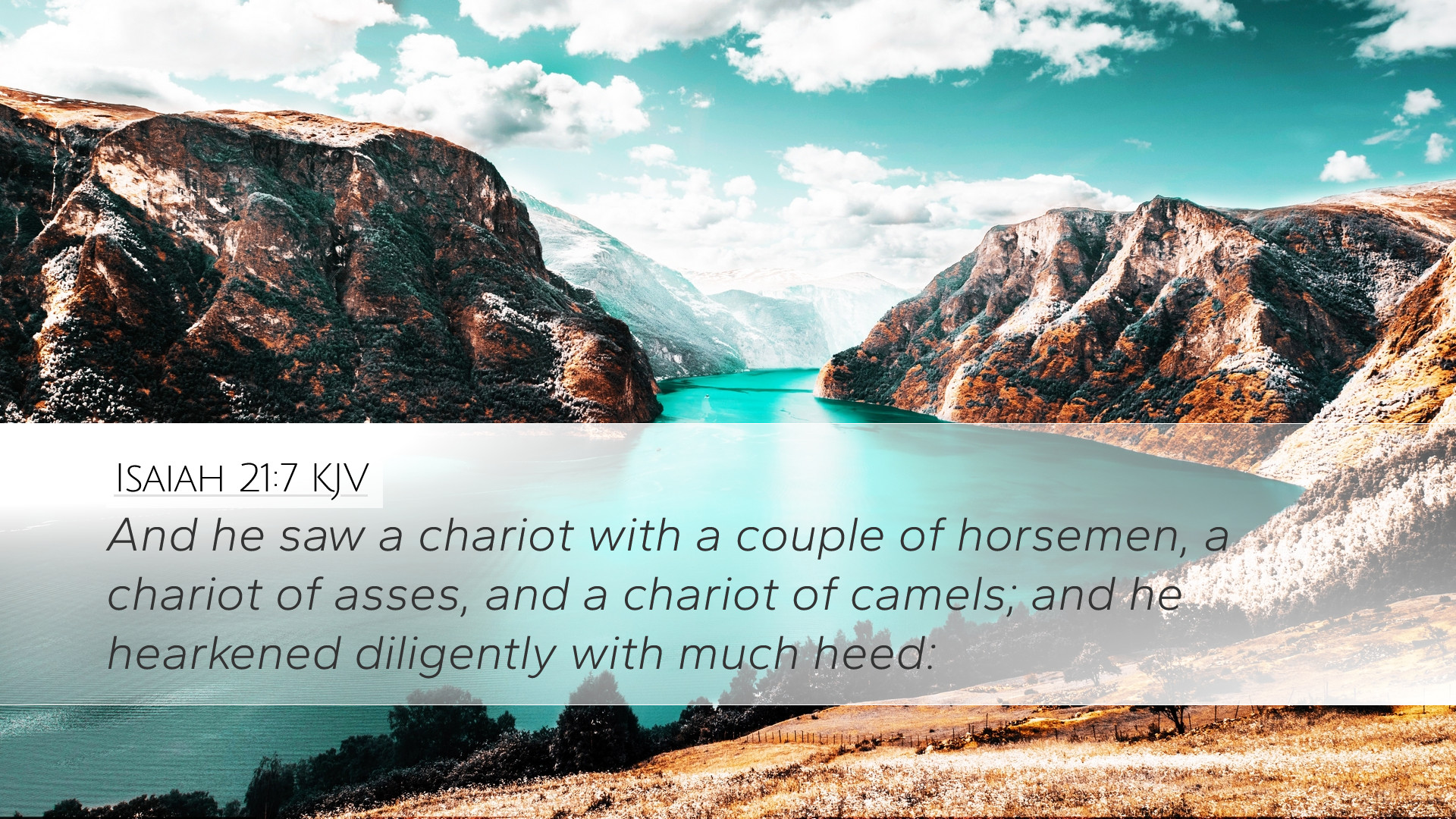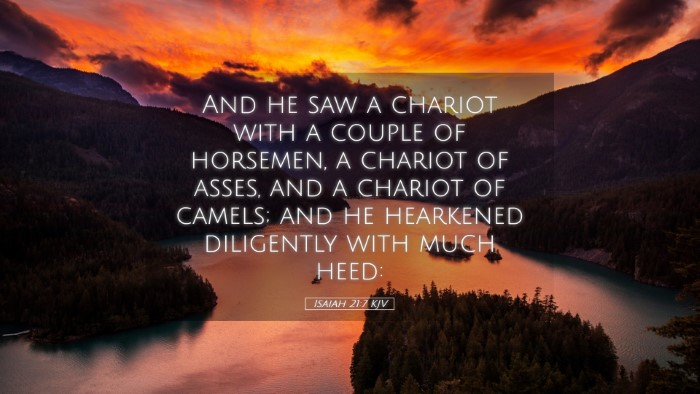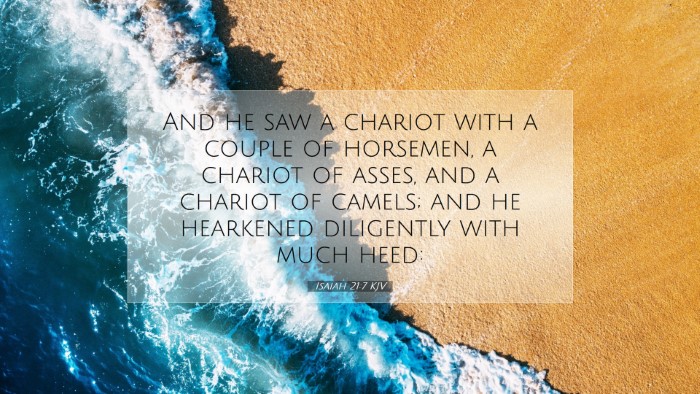Commentary on Isaiah 21:7
Verse Context: Isaiah 21:7 states, "And when he sees chariots, with teams of horses, he will take note; and when he sees the riders, he will notice that they are riding in pairs; and he will notice that they are riding in pairs." This verse captures the attention of a watchman positioned to observe the movement of forces, often interpreted as prophetic insight into unfolding events.
General Overview
This passage falls within a section of Isaiah that addresses the prophetic visions concerning various nations and cities. Isaiah 21 discusses the burden against Babylon and the destruction that looms over it. The imagery of watchmen and their diligence calls attention to the importance of vigilance and discernment in prophecy.
Insights from Public Domain Commentaries
Matthew Henry's Commentary
Matthew Henry emphasizes the role of the watchman, highlighting that the watchman is a metaphor for one who observes significant events, particularly those that signal divine judgment or prophetic fulfillment. He illustrates how the watchman's distinction between the different chariots and riders represents the discernment required to perceive God's hand in historical occurrences.
- Symbolism of Chariots: Chariots symbolize power and military might, indicative of impending threats or divine intervention. The distinction between the various teams signifies the nature of the forces at work in God's plan.
- Watchfulness: The repeated mention of the watchman's observations invites readers to reflect on their own spiritual vigilance. Just as the watchman notes the details of the scene, believers are called to be observant of both spiritual and earthly happenings.
- Divine Sovereignty: Henry accentuates God's sovereignty over nations, suggesting that the movement of these chariots is orchestrated by divine will, ultimately leading to the fulfillment of God's purposes.
Albert Barnes' Notes
Albert Barnes provides a detailed examination of the linguistic structure of the verse, noting the Hebrew terms and their implications for understanding the passage's deeper meanings. Barnes reflects on the actual scenario depicted – a watchman witnessing approaching chariots and their riders.
- Analysis of the Visuals: He describes the intricacies of the watchman’s vision, providing insight into the types of forces at play and their representation in prophetic literature.
- Historical Context: Barnes references the historical backdrop of the Babylonian empire's rise and fall, illustrating how this verse foreshadows significant events and the judgments that befall mighty nations.
- Prophetic Importance: The emphasis on pairs of riders suggests coordination and strategy, hinting at the divine intelligence behind the orchestration of these events. This mirrors the design of God in the unfolding of human history.
Adam Clarke's Commentary
Adam Clarke, known for his thorough explorations of Scripture, draws attention to the visionary aspect of the verse. He perceives it as a moment of revelation, where the watchman understands a great deal from the sight of seemingly ordinary occurrences.
- Interpretation of the Chariots: Clarke interprets the chariots not only as vehicles of war but also as symbols of change and upheaval. He pushes the reader to consider how such changes reflect God's will and the ultimate destiny of the people involved.
- The Role of the Watchman: He encourages believers and leaders alike to take on the mantle of watchfulness, warning against spiritual complacency. Clarke argues that in observing the world, one can glean insights about God’s movements and truth.
- Spiritual Vigilance: Clarke points out that vigilance in the spiritual sense allows believers to partner with God in discernment, helping them to lead and respond effectively to the world’s challenges.
Theological Implications
The theological themes in Isaiah 21:7 reflect the nature of God's justice and the necessity for humanity to be cognizant of divine occurrences. The watchman's perspective emphasizes the duality of divine prophecy—heightened awareness of both God’s judgment and His providential care for His people.
Encouragement for Modern Readers
This verse encourages contemporary readers, especially pastors and theologians, to cultivate a posture of watchfulness and discernment in a world rife with challenges. The call to notice the "chariots" around us—whether they signify conflict, change, or God’s evident workings—reminds us that faith requires diligence.
Practical Application
- Discernment: How can we exercise discernment in our daily lives? By actively observing the movements of God in our communities.
- Spiritual Leadership: Pastors should encourage congregants to be alert and informed about both spiritual and secular affairs, promoting proactive engagement with the world around them.
- Prayer and Vigilance: Engaging in prayer for clarity and guidance, we echo the watchman’s request for vigilance as a necessary discipline for spiritual growth.
Conclusion
Isaiah 21:7 serves as a rich verse that encapsulates the crucial role of vigilance in understanding God's purposes. By drawing from the insights of great commentators such as Matthew Henry, Albert Barnes, and Adam Clarke, we glean profound wisdom that informs our view of prophecy, divine sovereignty, and the human response to God’s movements in history.


